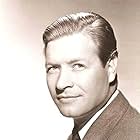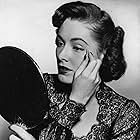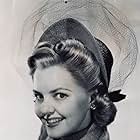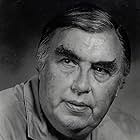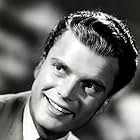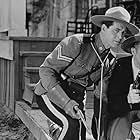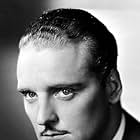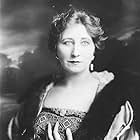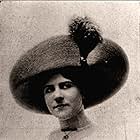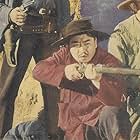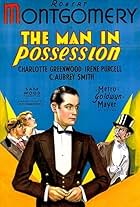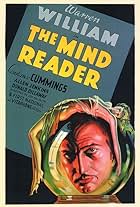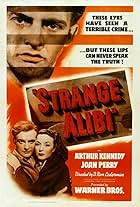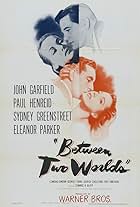A saboteur tries to place a bomb on a bus.A saboteur tries to place a bomb on a bus.A saboteur tries to place a bomb on a bus.
Featured reviews
This Warners programmer is rarely seen today, and that's a pity. It does show up occasionally on DVD, and I found a 16mm copy in the Wisconsin State Historical Society. I enjoyed the entertaining World War II-based storyline with its loose-lips-sink-ships propaganda. Warners didn't miss adding a plug for Victory Bonds, either. (Good for them.) It's set mostly within a large bus terminal along the California coast on one dark night shortly after the onset of the War. Within the spacious interior, civilians and military personnel intermingle around the big waiting-room and its ticket counters, the news-stand, cocktail lounge and restaurant, and also eventually in the rear service areas. This interplay allows the opportunity for the human drama to unfold.
At the time of production, there was a real-life submarine sighting along the West Coast, and in "Busses Roar" we see Axis spies and saboteurs scheme to plant a bomb on a coastline bus to create a target beacon for an offshore sub. That plot device pales, though, in comparison to the interesting characters who pass in and through the ornate bus station, each with his/her own traveler's tale to tell.
"Busses Roar" has a multi-personal, kaleidoscopic plot that you'll like, and another terrific plus is the great background music score by William Lava, Howard M. Jackson and Max Steiner. Today's expensive films should have such talent.
The second half of the film has road action on the pre-Interstate nighttime coastline highways, within those long, low-slung, almost sinister-looking front-engine buses with rooftop luggage racks that predate today's boring cruiser-coaches. (Interestingly, they're equipped with radios for background music and war news.)
As the spy plot thickens, there is a chase, failed brakes, and a runaway bus. (The buses do indeed roar as their headlights sweep the night and dramatic camera angles emphasize looming fenders, wheels and grilles. Great stuff.)
The Warners cast pulls it off gracefully with humor and without heavy-handed tactics. Willie Best, of course, steals every scene.
If you like the great 1940s Warner Brothers "look", or wartime-themed films, or great little programmers, or train/bus/plane/ship action films, seek out "Busses Roar". It's high entertainment that deserves being seen.
At the time of production, there was a real-life submarine sighting along the West Coast, and in "Busses Roar" we see Axis spies and saboteurs scheme to plant a bomb on a coastline bus to create a target beacon for an offshore sub. That plot device pales, though, in comparison to the interesting characters who pass in and through the ornate bus station, each with his/her own traveler's tale to tell.
"Busses Roar" has a multi-personal, kaleidoscopic plot that you'll like, and another terrific plus is the great background music score by William Lava, Howard M. Jackson and Max Steiner. Today's expensive films should have such talent.
The second half of the film has road action on the pre-Interstate nighttime coastline highways, within those long, low-slung, almost sinister-looking front-engine buses with rooftop luggage racks that predate today's boring cruiser-coaches. (Interestingly, they're equipped with radios for background music and war news.)
As the spy plot thickens, there is a chase, failed brakes, and a runaway bus. (The buses do indeed roar as their headlights sweep the night and dramatic camera angles emphasize looming fenders, wheels and grilles. Great stuff.)
The Warners cast pulls it off gracefully with humor and without heavy-handed tactics. Willie Best, of course, steals every scene.
If you like the great 1940s Warner Brothers "look", or wartime-themed films, or great little programmers, or train/bus/plane/ship action films, seek out "Busses Roar". It's high entertainment that deserves being seen.
Except for the stereotypical portrayal that Willie Best does in Buses Roar of the misspelled title, the film is a typical wartime propaganda film, just some fodder for the homefront morale. This concerns a rather inept bunch of saboteurs, a joint German-Japanese operation to blow up a bus.
This is not a terrorist act per se, the idea is to plant a bomb on a bus and detonate when it's near some undisclosed valuable wartime site. The passengers would be considered collateral damage in today's terms.
The film marked Eleanor Parker's feature film debut though she's billed fourth in the cast as a bus ticket agent who has a couple of drivers panting hot and heavy for her. The real stars are Richard Travis and Julie Bishop as a marine on leave and a woman who's hoping to charm the price of a ticket out of San Diego.
The saboteurs who are led by Peter Whitney make three different attempts to get the bomb on the bus. Law enforcement isn't to swift either in this comedy of errors.
Still the film has a certain charm to it, sad it had to include Willie Best at his worst.
This is not a terrorist act per se, the idea is to plant a bomb on a bus and detonate when it's near some undisclosed valuable wartime site. The passengers would be considered collateral damage in today's terms.
The film marked Eleanor Parker's feature film debut though she's billed fourth in the cast as a bus ticket agent who has a couple of drivers panting hot and heavy for her. The real stars are Richard Travis and Julie Bishop as a marine on leave and a woman who's hoping to charm the price of a ticket out of San Diego.
The saboteurs who are led by Peter Whitney make three different attempts to get the bomb on the bus. Law enforcement isn't to swift either in this comedy of errors.
Still the film has a certain charm to it, sad it had to include Willie Best at his worst.
This is a most enjoyable movie,catching the spirit of the enemy as depicted by Hollywood in early WWII. Such a movie would be "politically incorrect" these days, as would "Outrages of the Orient" which I recently purchased. I remembered it from childhood, but found it now to be trashy compared to "Buses Roar".
A group of international saboteurs is planning to bomb an oil facility. They settle on bombing a bus on its way to the location. They hope the explosion will light the way for a Japanese submarine to bombard the important targets. Reba Richards (Julie Bishop) gets tricked into carrying the suitcase bomb. Marine Sergeant Ryan (Richard Travis) is another passenger on the bus.
The comedic music cues are weird. Comedic tones just don't work with this material. This needs to be a tense thriller. Of course, that goes for Willie Best as well. I don't get the premise of making this a comedy in any way. It's odd to try and the comedy is so broad especially from Willie. It's telling that IMDB doesn't classify this as a comedy.
The comedic music cues are weird. Comedic tones just don't work with this material. This needs to be a tense thriller. Of course, that goes for Willie Best as well. I don't get the premise of making this a comedy in any way. It's odd to try and the comedy is so broad especially from Willie. It's telling that IMDB doesn't classify this as a comedy.
(How could they get this all the way out without someone realizing they had misspelled "Buses"?)
I loved this movie. You need to remember that in 1942, panic and hysteria were the order of the day along the West Coast, and in fact a Japanese submarine surfaced and shelled the Ellwood Oil Field off Santa Barbara on the night of 23 February. The next night, there was a mysterious episode in which gunners fired antiaircraft guns into the skies over LA, thinking there were unseen Japanese aircraft attacking them.
Even tho there were none, this came to be called The Battle of Los Angeles. Given the times, this movie is perfect.
"Busses (sic) Roar" is richly laced with fascinating characters, and as the movie unfolds, you begin to wonder where they are all going to come together.
The film succeeds in loading the bus with believable, identifiable people, and when peril ensues, you fear for them.
I caught this on TCM on 03 June 2013, and if it comes on again, I'll make it a point to watch.
I loved this movie. You need to remember that in 1942, panic and hysteria were the order of the day along the West Coast, and in fact a Japanese submarine surfaced and shelled the Ellwood Oil Field off Santa Barbara on the night of 23 February. The next night, there was a mysterious episode in which gunners fired antiaircraft guns into the skies over LA, thinking there were unseen Japanese aircraft attacking them.
Even tho there were none, this came to be called The Battle of Los Angeles. Given the times, this movie is perfect.
"Busses (sic) Roar" is richly laced with fascinating characters, and as the movie unfolds, you begin to wonder where they are all going to come together.
The film succeeds in loading the bus with believable, identifiable people, and when peril ensues, you fear for them.
I caught this on TCM on 03 June 2013, and if it comes on again, I'll make it a point to watch.
Did you know
- TriviaThe short that was theatrically released with this film is The Dover Boys at Pimento University or The Rivals of Roquefort Hall (1942).
- GoofsThe newsstand displays a varied number of unsold copies of The New Yorker and Collier's magazines. Unsold magazines would have been returned to the distributor when new issues were delivered.
- SoundtracksAutumn Nocturne
by Josef Myrow
Details
- Runtime58 minutes
- Color
- Aspect ratio
- 1.37 : 1
Contribute to this page
Suggest an edit or add missing content










